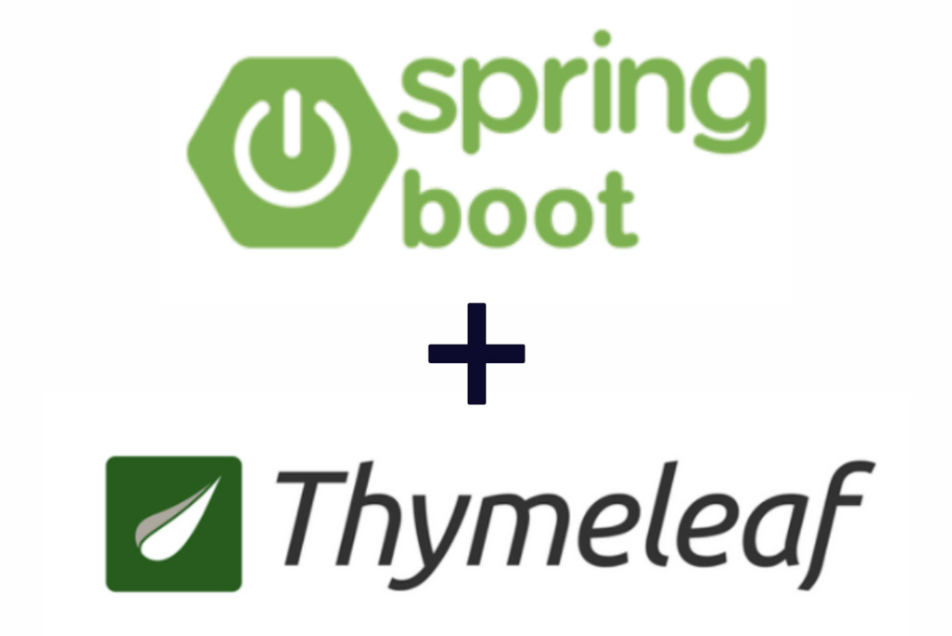
Spring Web Application 구현시 JSP를 이용해서 View를 구성하고 data 표현을 위해 HTML 태그에 <% %> 로 자바 언어를 사용했습니다. JSP를 사용하면 Web Application 배포시 WAR(Web Archive) 파일로 생성되는데, WAR는 Web Application 압축타입으로 Servlet(JSP) 해석과 관련된 모든 패키지들을 포함시키면서 복잡하고 무거운 구조였습니다.
그리고, JSP 자체가 서버 측 언어로 그 사용빈도가 줄고 있습니다.
JSP 의 잇점인 '스크립틀릿(scriptlet)'이라는 기능이 있어서 자바코드를 직접 태그안에 작성할 수 있습니다. 이런 이점이 있지만, 뷰 부분에 코드가 섞여서 로직을 분리하기 어려워 지기 때문에 JSP에 의존하는 개발은 피해야 하는 추세입니다.
순수하게 Java Application(jar)로만 웹 구현과 기동이 가능한 Template Enginee이라는 HTML과 Data를 하나로 결합시켜 처리하는 도구를 이용하는 개념이 도입됩니다.
Spring Boot에서는 Thymeleaf(타임리프)라는 Template Enginee이 주로 사용되고 있습니다.
1. pom.xml에 dependency 추가
<dependency>
<groupId>org.springframework.boot</groupId>
<artifactId>spring-boot-starter-thymeleaf</artifactId>
<version>2.1.0.RELEASE</version>
</dependency>gradle 인 경우는 build.gradle에 아래내용을 추가
dependencies {
//thymeleaf
implementation 'org.springframework.boot:spring-boot-starter-thymeleaf'
implementation 'nz.net.ultraq.thymeleaf:thymeleaf-layout-dialect'
...
}
2. application.properties에서 thymeleaf 설정 추가
spring.thymeleaf.enabled=true
spring.thymeleaf.encoding=UTF-8
spring.thymeleaf.prefix=/WEB-INF/views/
spring.thymeleaf.suffix=.htmlspring.thymeleaf.enabled → thymeleaf의 사용을 enable.
spring.thymeleaf.encoding → thymeleaf의 인코딩을 UTF-8로 기본 설정.
spring.thymeleaf.prefix → thymeleaf의 기본 경로인 templates를 원하는 임의의 경로로 변경 가능.
spring.thymeleaf.suffix → thymeleaf가 읽어들이는 파일의 확장자를 설정한다. 예를 들어 위와 같이 .html 으로 설정했다면 Controller 코드의 method에서 return "index"; 로 처리할 경우, 자동적으로 index.html을 읽어 옴.
- Thymeleaf의 기본 폴더 경로
Thymeleaf에서는 기본적으로 resources 폴더의 templates폴더에 html 파일들이 위치한다.
이 외의 css, js 등의 정적 파일들은 static 폴더에 위치하게 된다.
- Trouble Shooting
1. ERROR - org.thymeleaf.exceptions.TemplateInputException: Error resolving template “index”, template might not exist or might not be accessible by any of the configured Template Resolvers
→ templates 폴더에 "index.html"파일이 없어서 발생하는 문제입니다. 이 외에도 해당 경로에 대상 view가 없으면 이와 같은 에러가 발생합니다.
2. 기존에 JSP를 사용하고 있다면, jstl과 jasper 관련 설정을 pom.xml에서 주석 처리 해주어야 합니다.
참조 : https://www.thymeleaf.org/documentation.html
Documentation - Thymeleaf
Articles Quick glimpses into what Thymeleaf can bring to your project. Introductions With Spring Comparisons
www.thymeleaf.org
Thymeleaf 표현법
th 네임스페이스를 이용 ex) th:text="......."
1. 변수식
"${ }"
2. 유틸리티 객체
"${#겍체. }"
자바 클래스 중 자주 사용하는 클래스를 '#이름'이라는 상수로 정의해서 변수식 안에 직접 작성가능합니다.
th:text="${#dates.format(new java.util.Date(), 'dd/MMM/yyyy HH:mm')}"
>> 06/2월/2022 11:23
th:text="${#number.formatInteger(1234,7)}"
>> 0001234
th:text="${#strings.toUpperCase('Welcone to Spring')}"
>> WELCOME TO SPRING
3. 매개변수에 접근하기
"${param.매개변수}"
'/index?id=123&id=456' 접속시 123, 456 이라는 값을 처리에 이용할 수 있습니다.
th:text="'parameter is '+${param.id[0]}+', '+${param.id[1]}"
다수의 리터럴을 연결할 때에는 큰 따옴표 내에 작은 따옴표로 리터럴을 사용해야 합니다.
4. 메시지식
"#{ }"
messages.properties 라는 파일을 resources 폴더 내에 생성합니다.
th:text="#{content.title}"
content.title=message sample page.
content.message=this is sample message.
5. 링크식과 href
<a th:href="@{주소}">
<a th:href="@{'/home/' + ${param.id[0]}}">Link</a>
6. 선택객체의 변수식
<th:object="${객체}">
<th:text="*{프러퍼티}">
ModelAndView modelAndView = new ModelAndView();
Person person = new Person(12, "Lee");
modelAndView.addObject("myPerson", person);
<table th:object="${myPerson}">
<tr><th>Name</th><td th:text="*{name}"></td></tr>
<tr><th>Age</th><td th:text="*{age}"></td></tr>
</table>7. 리터럴 치환
변수식 내에서 몇 개의 값을 조합해서 출력하는 경우 "'A'+'B'"와 같이 큰 따옴표 내에서 다시 텍스트 리터럴을 연결했습니다. 이보다 더 간단한 '리터럴 치환'이라는 작성법이 있습니다.
"| 텍스트 내용 |"
<div th:object="${myPerson}">
<p th:text="|My name is *{name}, age is *{age}.|" </p>
</div>
8. HTML 코드 출력
th:utext
9. 조건식
${check} ? ${trueVal} : ${falseVal}
10. 조건분기
th:if="조건"
th:unless="조건"
th:switch / th:case
<p th:if="${check}" th:text="${trueVal}"></p>
<p th:unless="${check}" th:text="${falseVal}"></p>
<div th:switch="${check}">
<p th:case="0" th:text="| value is 0 |"></p>
11. 반복문
th:each
<th:each="변수" : ${컬렉션}>
...${변수}를 사용한 구문
"value:${list}"
12. 인라인 처리
<!-- th:text 대신 인라인 처리 [[${변수}]] -->
인라인처리는 태그에 th:inline="text"라고 작성하면 해당 태그 내부에서만 인라인 처리가 가능해집니다.
<td th:text="${obj}"></td>
<td> [[${obj}]]</td> //<-------- 위 th:text는 td 태그와 같이 표현되지만, 인라인 처리는 다름에 유의!
<index.html>
<!DOCTYPE html>
<html lang="en">
<head>
<meta charset="UTF-8">
<title>Title</title>
<link rel="stylesheet" href="style.css" type="text/css"/>
</head>
<body>
<p th:text="${#dates.format(new java.util.Date(), 'dd/MMM/yyyy HH:mm')}"> </p>
<p th:text="#{content.title}"> Hello title </p>
<p th:text="#{content.message}"> message </p>
<p><a th:href="@{'/home/'}">Link</a></p><br>
<table th:object="${myPerson}">
<tr><th>Name</th><td th:text="*{name}"></td></tr>
<tr><th>Age</th><td th:text="*{age}"></td></tr>
</table>
<div th:object="${myPerson}">
<p th:text="|My name is *{name}, age is *{age}.|" </p>
</div>
<table th:inline="text">
<tr>
<th>Name</th>
<th>Email</th>
</tr>
<tr th:each="obj : ${myData}">
<td th:text="${obj[0]}"></td>
<td>[[${obj[1]}]]</td>
</tr>
</table>
</body>
</html>

Source : https://github.com/kakarooJ/SpringBoot_Thymeleaf
GitHub - kakarooJ/SpringBoot_Thymeleaf
Contribute to kakarooJ/SpringBoot_Thymeleaf development by creating an account on GitHub.
github.com
'Web' 카테고리의 다른 글
| 1 - Spring Boot - Start Application<IntelliJ-Gradle> (0) | 2022.02.07 |
|---|---|
| Spring Boot - Database 처리방법 (0) | 2022.02.06 |
| Spring Boot 기본 (공사중..) (0) | 2022.02.05 |
| 3. Spring Boot - MyBatis (0) | 2022.02.03 |
| 2. Spring Boot - MySQL/MyBatis 연동 (0) | 2022.02.03 |